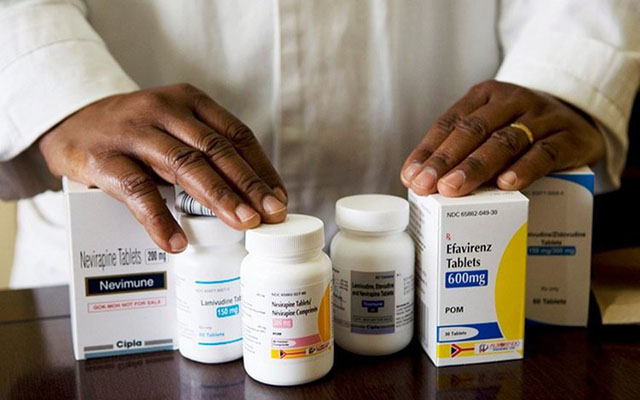ARV shortage sparks fears of drug resistant HIV strains

Runyararo Muzavazi Features Writer
Zimbabwe needs to take urgent steps to increase the availability of life-prolonging anti-retroviral drugs at all public health institutions to prevent drug resistance and other complications, HIV lobbyists say.
HIV and Aids activists say the shortages limit access to critical medications and compromise patient safety, resulting in serious illness and even death. Tendayi Westerhof, a Pan African Positive Women’s Coalition activist says: “The future looks bleak for people living with HIV and those suffering from other non-communicable ailments as a result of the uncertainty over the supply of ARVs in public hospitals and clinics.
“Signs of shortages of the drugs started several months ago and the situation is getting worse. As activists, we are concerned about this trend.” Westerhof says lack of financial resources has hit the health sector leading to an acute shortage of life-prolonging drugs.
“It is now a known fact that the HIV treatment regimen such as ABC, 3TC supplies have become erratic as the treatment continues to be in short supply,” the HIV lobbyist says.
“It’s very unfortunate that the treatment agenda to ensure that people living with HIV continue to receive their treatment is being overtaken by priorities such as agricultural inputs, mining, manufacturing, water and sanitation sectors.
“Access to treatment and medicines is not being given the urgency it requires as far as allocation of foreign currency is concerned and yet it is also a developmental issue and part of Zim-Asset.”
The current shortage of ARVs has become a threat to many lives that depend on them for survival. HIV activists say it is demoralising to note that Zimbabwe, a country which has been successful in reducing the number of people living with HIV and HIV-related deaths, is battling to supply sufficient life-prolonging drugs.
Health experts say limited availability of ARVs hinders patient initiation, adherence and poses a major obstacle to winning against HIV response as a country which calls for optimal devotion to ensure individual treatment access and limit viral resistance.
Out of an estimated 1, 2 million people living with HIV, 800 000 are on ARVs and 350 000 of them are on second line treatment, according to the Ministry of Health and Child Care figures. Fears continue to grow among people living with HIV that they might all end up being drug resistant.
“We fear that this will derail the gains made to end HIV and AIDS by 2030,” says Westerhof.
“More people will likely develop drug resistance for as long as their treatment is interrupted due to these erratic supplies that can be abated if the authorities put their priorities right.”
She urged Government to reduce the drug resistant test fees and ensure that treatment was available in both private and public health institutions.
The HIV lobbyist called on Parliament to ensure that the Reserve Bank of Zimbabwe quickly availed foreign currency for the procurement of ARVs. Lack of foreign currency has affected the import of life-saving drugs leaving those dependent on them prone to death.
The current shortages have pushed up treatment costs, putting the drugs beyond the reach of many. Shortages in the public sector have forced many people to seek the drugs in private health institutions which are now over-burdened. ARV shortages have been fuelled by the unavailability of foreign currency in the country.
HIV and Aids activists called on the RBZ Governor Dr John Mangudya to urgently address the matter to save lives. If quick action is not taken, the activists say, the UNAids 90-90-90 objectives will be derailed.
The 90–90–90 — is an ambitious treatment target that broadly aims to help end the AIDS epidemic. It aims to ensure that by 2020, 90 percent of all people living with HIV will know their HIV status, 90 percent of all people with diagnosed HIV infection will receive sustained anti-retroviral therapy.
It also aims to ensure that by 2020, 90 percent of all people receiving anti-retroviral therapy will have viral suppression. Zimbabwe Aids Network lobbyist Mr Walter Chikanya says there is need to increase drug availability to cope with the rising demand for life-prolonging drugs.
“We need more ARVs so that we can help more people to access life-saving drugs,” Chikanya says.
“If the issue is not addressed we might end up having new infections popping up from different angles worsening the situation. More resources should be availed to secure adequate stocks of drugs.” He says people living with disability should be given priority in the wake of ARV shortages nationwide.
Zimbabwe Aids Network national coordinator Mr Taurai Nyandoro says the increase in the number of people who are migrating from first line treatment to second line treatment is also causing a shortage in drugs as demand exceeds supply. He urged the Government to put more resources to sustain a sufficient supply of drugs.
Centre for Disease Control and Prevention (CDC) branch chief for HIV Services- Zimbabwe, Shirish Balachandra says there is need to come up with strategies to contain the rise of anti-microbial resistance, which has significant overlap with the issue of infection prevention and control.
“Given the increasing resistance to first-line antibiotics, a broad range of common infections are now much more difficult to treat. Second and third-line regimens are proving to be costly, more likely to have side-effects, and require much longer durations of treatment.
“US government is committing $130 million towards Zimbabwe’s response to HIV. Part of the funding, drawn from the President’s Emergency Plan for AIDS Relief (PEPFAR), will be channelled towards disease surveillance and prevention of TB infection programs ,” said Mr Balachandra. Southern Africa HIV and AIDS Information Dissemination Service (SAfAIDS) representative Leonard Dembure called for ease access to health facilities for key populations.
“When drugs are in short supply it becomes very difficult for people that depend on them to access them because usually those that have them in stock will increase the prices,” he says.
“There is need for Zimbabwe to come up with economic strategies that will reduce the shortages of drugs and most importantly the number of children that are engaging in child prostitution, so that when drugs are supplied they will be able to meet the demand.”
Health experts say other factors that could be resulting in the increase of drug resistant patients at primary care stage is the level and quality of staffing, expertise and resources. Zimbabwe is largely depending on outside help to roll its HIV and Aids programs. The United Nations Development Programme (UNDP) and the Global Fund have over the past few years provided funding running into millions of dollars to help scale up the fight against HIV in the country.
Funding to the Global Fund’s existing HIV grant to Zimbabwe now exceeds $611 million. The existing HIV grant supports 880 000 people in Zimbabwe to access life-saving HIV treatment. HIV remains a major public health challenge in the country with an estimated 1,4 million people living with HIV. Even though Zimbabwe has seen one of the sharpest declines in HIV prevalence in the region, at 16,1 percent, it has among the highest HIV prevalence rates in the world.
Zimbabwe records some 50 000 new HIV infections a year and more than 40 000 people die from the deadly pandemic each year. The World Health Organisation report on HIV indicates that sub-Saharan Africa alone accounted for an estimated 69 percent of all people living with HIV and 70 percent of all Aids deaths worldwide in 2011. The Sadc region accounts for 34 percent of HIV infections, according to a 2010 UNAids global report.











Comments